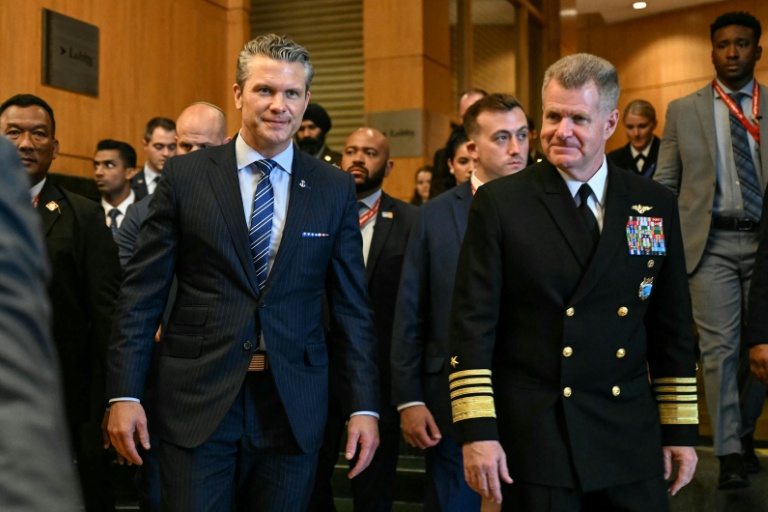World
Chinese Defence Minister Calls for Trust with US Amid Taiwan Tensions

The defence ministers of China and the United States met in Malaysia on Friday, with China’s Minister of Defence, Dong Jun, emphasizing the need for “trust” to foster coexistence between the two nations. This dialogue took place on the sidelines of a Southeast Asian regional defence summit, just a day after a meeting between Presidents Xi Jinping and Donald Trump in South Korea. Although Taiwan was not a topic of their discussion, Dong expressed significant concerns regarding U.S. actions and statements related to the self-governing island.
During his conversation with U.S. Defence Secretary Pete Hegseth, Dong reiterated that the “unification of the two sides of the Taiwan Strait is an irresistible historical trend.” He urged the United States to exercise caution in its approach to Taiwan and to adopt a firm stance against any moves towards “Taiwan independence.” The Chinese government considers Taiwan a part of its territory, a position that has been a longstanding point of contention with Washington, which maintains official ties only with Beijing while supporting Taiwan’s self-defence capabilities.
In addition to discussing Taiwan, Dong highlighted the importance of both countries’ defence ministries taking “concrete actions” to implement the agreements reached by their respective heads of state. He called for enhanced policy-level dialogue to build trust and reduce uncertainty, aiming to establish a bilateral military relationship founded on principles of equality, respect, and peaceful coexistence.
Hegseth described the meeting in Kuala Lumpur as “good and constructive.” He emphasized the necessity of maintaining a balance of power in the Indo-Pacific region and raised U.S. concerns regarding China’s activities in the South China Sea and around Taiwan. In a statement on social media platform X, he acknowledged the importance of addressing U.S. allies and partners in the region.
Earlier this year, Hegseth warned that China was “credibly preparing” to use military force to disrupt the regional balance of power, remarks that elicited a strong response from Beijing. At the Shangri-La Dialogue in Singapore in June, he stated, “The threat China poses is real and it could be imminent.” This statement underscored the ongoing tensions surrounding China’s claims over almost the entirety of the South China Sea, which overlaps with claims from several neighbouring countries. The U.S. Navy has routinely conducted “freedom of navigation” operations in the area, further aggravating relations with Beijing.
Despite these tensions, Hegseth moderated his remarks during the recent meeting, stating that the “United States does not seek conflict” but will continue to defend its interests vigorously in the region. His diplomatic overtures included discussions with other officials at the ASEAN Defence Ministers’ Meeting, where he engaged with representatives from the 11-member bloc, including India’s Rajnath Singh. Hegseth and Singh signed a ten-year agreement aimed at deepening cooperation between their nations, which will see India acquiring U.S. military equipment such as patrol planes, missiles, and combat vehicles.
Hegseth concluded his engagements in Malaysia with plans to participate in a meeting with ASEAN defence chiefs, underscoring the significance of collaboration and dialogue in navigating the complexities of regional security dynamics.
-

 Science3 months ago
Science3 months agoToyoake City Proposes Daily Two-Hour Smartphone Use Limit
-

 Top Stories3 months ago
Top Stories3 months agoPedestrian Fatally Injured in Esquimalt Collision on August 14
-

 Health3 months ago
Health3 months agoB.C. Review Reveals Urgent Need for Rare-Disease Drug Reforms
-

 Technology3 months ago
Technology3 months agoDark Adventure Game “Bye Sweet Carole” Set for October Release
-

 World3 months ago
World3 months agoJimmy Lai’s Defense Challenges Charges Under National Security Law
-

 Lifestyle3 months ago
Lifestyle3 months agoVictoria’s Pop-Up Shop Shines Light on B.C.’s Wolf Cull
-

 Technology3 months ago
Technology3 months agoKonami Revives Iconic Metal Gear Solid Delta Ahead of Release
-

 Technology3 months ago
Technology3 months agoApple Expands Self-Service Repair Program to Canada
-

 Technology3 months ago
Technology3 months agoSnapmaker U1 Color 3D Printer Redefines Speed and Sustainability
-

 Technology3 months ago
Technology3 months agoAION Folding Knife: Redefining EDC Design with Premium Materials
-

 Business3 months ago
Business3 months agoGordon Murray Automotive Unveils S1 LM and Le Mans GTR at Monterey
-

 Technology3 months ago
Technology3 months agoSolve Today’s Wordle Challenge: Hints and Answer for August 19









